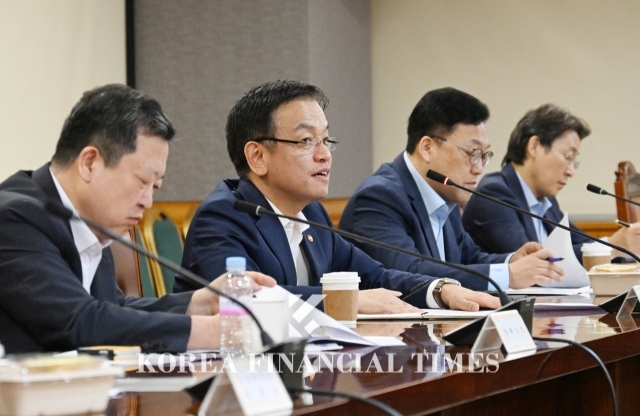 이미지 확대보기
이미지 확대보기Choi Sang-mok, Deputy Prime Minister and Minister of Strategy and Finance, held an urgent meeting on macroeconomic and financial issues at the National Banking Association Hall on June 6 with Bank of Korea(BOK) Governor Lee Chang-yong, Chairman of the Financial Services Commission(FSC) Kim Byung-hwan, Financial Supervisory Service(FSS) Governor Lee Bok-hyun, and Chief Economic Advisor Park Chun-seop to review recent domestic and international financial market trends and discuss future responses.
Key players at the meeting said that the lack of assessment of the U.S. market has led to further damage to Asian equities. There was a sense of overreaction to the current events.
Over the past five days, the Kospi has dropped 8.77% from the previous trading day, and Japan's Nikkei has plunged 12.40%.
However, the market's reaction is unusual. In the past, market shocks have affected real assets, stocks, bonds, and foreign exchange simultaneously, but this time, only the stock market showed a major correction.
In addition, the foreign exchange and money markets have been performing well as Korea's economy is gradually showing signs of recovery. The government and the BOK agreed that the BOK has sufficient policy response capacity to deal with market volatility due to external shocks.
Choi said the government plans to continue operating a 24-hour joint inspection system as external uncertainties remain high, including the spread of geopolitical unrest in the Middle East and the US presidential election. In addition, if market volatility escalates, they will closely coordinate according to the situation-specific response plan. The participants were urged to maintain the response system of related organizations so that market stabilization measures can be implemented quickly if necessary.
Lee Sungkyu (lsk0603@fntimes.com)
가장 핫한 경제 소식! 한국금융신문의 ‘추천뉴스’를 받아보세요~
데일리 금융경제뉴스 Copyright ⓒ 한국금융신문 & FNTIMES.com
저작권법에 의거 상업적 목적의 무단 전재, 복사, 배포 금지








![용산구 ‘나인원한남’ 88평, 9억 상승한 167억원에 거래 [일일 아파트 신고가]](https://cfnimage.commutil.kr/phpwas/restmb_setimgmake.php?pp=006&w=284&h=214&m=5&simg=2025071010042800278b372994c952115218260.jpg&nmt=18)










